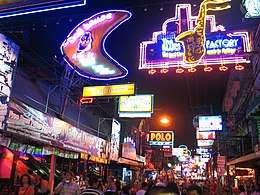Pattaya
Pattaya (Thai: พัทยา, RTGS: Phatthaya, pronounced [pʰát.tʰā.jāː] (![]()
Pattaya พัทยา | |
|---|---|
Special Governed City | |
| Pattaya City เมืองพัทยา | |
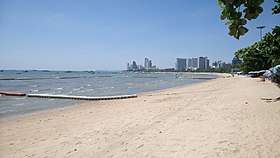  From left: Pattaya Beach with the city in the background, Nong Nooch Garden, Pattaya sunset, bird's eye view of Pattaya, The Sanctuary of Truth, Walking Street | |
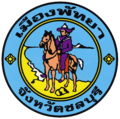 Seal | |
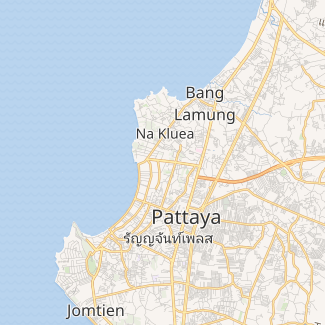
| |
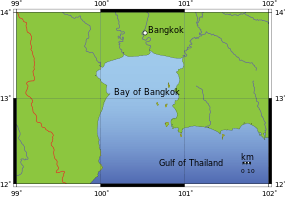 Pattaya Location in Bay of Bangkok 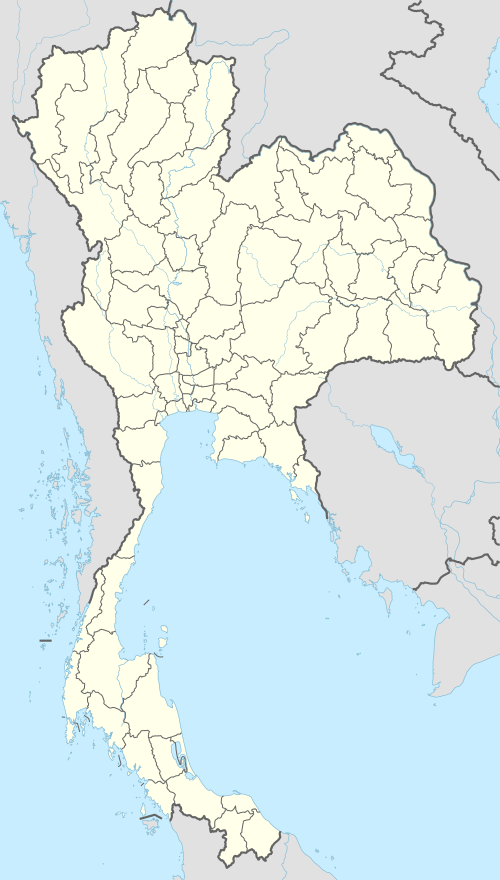 Pattaya Location in Thailand | |
| Coordinates: 12°56′N 100°53′E | |
| Country | Thailand |
| Province | Chonburi |
| District | Mueang Pattaya |
| Self-administrating municipality | 30 Oct 1978 |
| Government | |
| • Type | City municipality |
| • Mayor | Sontaya Kunplome since Sept 2018[1] |
| Area | |
| • Total | 53.4 km2 (20.6 sq mi) |
| Area rank | 8th |
| Population (2019)[2] | |
| • Total | 119,532 (Registered residents) |
| • Rank | 10th |
| • Density | 2,238/km2 (5,800/sq mi) |
| • Census figures | 320,262 (Census count) |
| Time zone | UTC+7 (ICT) |
| Postcode | 20150 |
| Calling code | 038 |
| ISO 3166-2 | TH-S |
| Website | www |
History
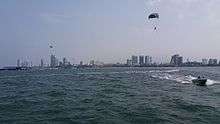
The name Pattaya evolved from the march of Phraya Tak (later King Taksin) and his army from Ayutthaya to Chanthaburi, which took place before the fall of the former capital to Burmese invaders in 1767. When his army arrived in the vicinity of what is now Pattaya, Phraya Tak encountered the troops of a local leader named Nai Klom, who tried to intercept him. When the two met face to face, Nai Klom was impressed by Phraya Tak's dignified manner and his army's strict discipline. He surrendered without a fight and joined his forces. The place the armies confronted each other was thereafter known as "Thap Phraya", which means the "army of the Phraya". This later became Pattaya, the name of the wind blowing from the south-west to the north-east at the beginning of the rainy season.
Pattaya was a fishing village until the 1960s. Tourism began during the Vietnam War, when American servicemen began arriving on R&R (rest and relaxation). One large group who arrived from a base in Korat on 29 June 1959 and rented houses from Phraya Sunthorn at the south end of the beach, on what is now known as the "Strip", are credited with recommending Pattaya, whose fame spread by word of mouth.[3][4]
Climate
Pattaya has a tropical wet and dry climate, which is divided into the following seasons: hot and dry (December to February), hot and humid (March and April), and hot and rainy (May to November).
| Climate data for Pattaya (1981–2010) | |||||||||||||
|---|---|---|---|---|---|---|---|---|---|---|---|---|---|
| Month | Jan | Feb | Mar | Apr | May | Jun | Jul | Aug | Sep | Oct | Nov | Dec | Year |
| Record high °C (°F) | 36.0 (96.8) |
37.1 (98.8) |
37.3 (99.1) |
37.0 (98.6) |
36.0 (96.8) |
35.4 (95.7) |
34.9 (94.8) |
34.5 (94.1) |
33.7 (92.7) |
33.8 (92.8) |
35.6 (96.1) |
35.9 (96.6) |
37.3 (99.1) |
| Average high °C (°F) | 30.6 (87.1) |
31.1 (88.0) |
31.8 (89.2) |
32.9 (91.2) |
32.4 (90.3) |
31.7 (89.1) |
31.4 (88.5) |
31.2 (88.2) |
31.0 (87.8) |
30.8 (87.4) |
30.5 (86.9) |
30.0 (86.0) |
31.3 (88.3) |
| Daily mean °C (°F) | 26.3 (79.3) |
27.3 (81.1) |
28.2 (82.8) |
29.3 (84.7) |
29.2 (84.6) |
28.9 (84.0) |
28.5 (83.3) |
28.4 (83.1) |
27.7 (81.9) |
27.0 (80.6) |
26.7 (80.1) |
25.9 (78.6) |
27.8 (82.0) |
| Average low °C (°F) | 23.0 (73.4) |
24.4 (75.9) |
25.4 (77.7) |
26.3 (79.3) |
26.4 (79.5) |
26.3 (79.3) |
26.0 (78.8) |
26.0 (78.8) |
25.2 (77.4) |
24.4 (75.9) |
23.7 (74.7) |
22.5 (72.5) |
25.0 (77.0) |
| Record low °C (°F) | 16.4 (61.5) |
18.5 (65.3) |
17.7 (63.9) |
20.8 (69.4) |
21.5 (70.7) |
21.3 (70.3) |
21.4 (70.5) |
22.0 (71.6) |
21.5 (70.7) |
19.8 (67.6) |
16.7 (62.1) |
14.6 (58.3) |
14.6 (58.3) |
| Average rainfall mm (inches) | 15.6 (0.61) |
14.3 (0.56) |
53.3 (2.10) |
64.0 (2.52) |
148.3 (5.84) |
119.0 (4.69) |
97.4 (3.83) |
97.6 (3.84) |
204.7 (8.06) |
216.1 (8.51) |
72.1 (2.84) |
8.3 (0.33) |
1,110.7 (43.73) |
| Average rainy days | 1.6 | 2.5 | 4.5 | 6.4 | 11.8 | 12.0 | 12.4 | 13.1 | 16.6 | 17.3 | 6.0 | 1.4 | 105.6 |
| Average relative humidity (%) | 73 | 77 | 77 | 77 | 78 | 77 | 77 | 77 | 81 | 83 | 76 | 70 | 77 |
| Mean monthly sunshine hours | 229.4 | 211.9 | 238.7 | 204.0 | 155.0 | 114.0 | 117.8 | 114.7 | 108.0 | 145.7 | 189.0 | 226.3 | 2,054.5 |
| Mean daily sunshine hours | 7.4 | 7.5 | 7.7 | 6.8 | 5.0 | 3.8 | 3.8 | 3.7 | 3.6 | 4.7 | 6.3 | 7.3 | 5.6 |
| Source 1: Thai Meteorological Department[5] | |||||||||||||
| Source 2: Office of Water Management and Hydrology, Royal Irrigation Department (sun and humidity)[6] | |||||||||||||
Demographics
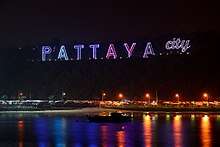
The city (mueang) had 320,262 people resident and counted on census 2010 (National Statistics Office).[7] Most of these people counted are Thai, with most migrant populations not recognized, although the details are quite complex as there are even indigenous Thais without nationality, and migrant workers have since been largely regularized (albeit with due foreign pressure). Therefore, the census population even does not represent the total figure. As for Thai nationals and legal permanent residents (very few) registering the city as their hometown, the provincial authority logged population was 107,944 in 2010, modestly rising to 119,530 by 2019.[2] As with the Bangkok Metropolitan Region, registered population figure issued by a different agency than the National Statistics Office hardly captures the scope of the urban transformation that has occurred over the time span – the economy is dependent on the large numbers of casual Thai workers who work in the city yet remain registered in their hometowns, there is much employment turnover and to and from the capital, as well as seasonal farm migration. Migrant workers from neighboring nations, and many long-term expatriates who reside in the city as retirees or self-employed or contracted are traditionally not counted. There has never been a reliably published figure for total population, but its thought to be quite large (on the order of half a million people) given the ubiquity and sheer number of migrant workers taking place of Thai labor. Pattaya city excludes some nearby areas like Nong Prue (73,901 people in 2010 census) and Huay Yai.
Pattaya additionally has massive population inflow from short stay tourism, with its 2000 hotels and 136,000 rooms available as of 2015.[8]
Due to the tourist industry, many people from the north-east (known as Isan, the poorest region of Thailand) have come to work in Pattaya, and are counted for census purposes in their hometowns. A majority of these northeast workers fulfill positions in the Go-Go bar industry, the pay they can earn is far more than that in their home region of Isaan.
A growing community of foreign retirees live in Pattaya. Thailand immigration has a special visa category for foreigners over age 50 who wish to retire in Thailand. Pattaya is attractive to many retirees from other countries not only because of its climate and lifestyle, but also because living costs are lower than in many countries.
Physical geography
Pattaya, on the Gulf of Thailand, is approximately 160 kilometres (99 mi) south of the city of Bangkok in Bang Lamung District, Chonburi Province.
The city of Pattaya is a special municipal area which covers the whole tambon Nong Prue (Nongprue) and Na Kluea (Naklua) and parts of Huai Yai and Nong Pla Lai. Bang Lamung township which forms the northern border of Pattaya covers parts of the tambon Bang Lamung (Banglamung), Nong Pla Lai and Takhian Tia. Bang Sare (Bang Saray) is on the southern border of Pattaya.
"Greater Pattaya" occupies most of the coastline of Banglamung (one of the eleven districts that make up Chonburi Province). It is divided into a larger northern section which spans the areas to the east of Naklua Beach (the most northern beach) and Pattaya Beach (the main beach) plus Pratamnak Hill (often called "Buddha Hill" because of the temples on top of the hill) headland immediately south of Pattaya Beach, and a smaller southern section covering the area to the east of Jomtien Beach (directly south of Pratamnak Hill).
Beaches and islands
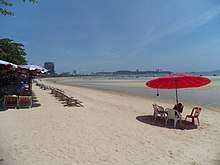
The main sweep of the bay area is divided into two principal beachfronts. Pattaya Beach lies parallel to the city centre, and runs from Pattaya Nuea south to Walking Street, about 2.7 km long. The beach, which used to be 35 m wide, suffers from erosion and in some places was reduced to a width of only two to three meters. A 429 million baht beach restoration scheme was implemented in 2018. It will take 360,000 m3 of sand from Ko Rang Kwian offshore to increase the beach width to 50 m.[9] Without intervention Pattaya will likely see its beaches disappear in roughly ten years according to Chulalongkorn University researchers. Within a month of the completion of the restoration of the first 400 m of Pattaya Beach, the work was "seriously damaged" by flooding. The beach is the first in the country to use imported sand to compensate for coastal erosion. An official said, "...the longer it is left without the flood damage being repaired, the worse it will get."[10]
Pratumnak is on the south side of Pattaya and is popular for its viewpoints and the temple (Wat Phra Yai) on top of the hill. Pattaya Park and Pattaya tower are at the south end of Pratumnak and the Pattaya Exhibition And Convention Hall (P.E.A.C.H), is positioned at the north end of Pratumnak. In recent years, Pratumnak has gained in popularity because of its more natural environment, nicer beaches, and its convenient location between Jomtien and Pattaya city.
Jomtien is divided from Pattaya by Thepprasit Road, the southern route into Pattaya city. It consists of high-rise condominiums, beach side hotels, bungalow complexes, shops, bars, and restaurants.
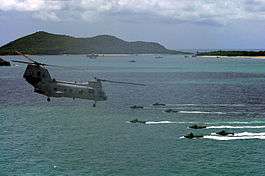
Offshore islands include three "near islands": Ko Lan (main island), Ko Sak, and Ko Krok, 7 kilometres (4.3 mi) from the shore of Pattaya. The "far islands" are Ko Phai (main island), Ko Man Wichai, Ko Hu Chang and Ko Klung Badan, located offshore further west of the "near islands". Ko Rin lies offshore to the south-west, south of Ko Phai group. The names "near islands", "far islands", and "Coral Island" are used for marketing purposes only and do not correspond to any naming conventions of the island groups and are not shown on maritime charts published by the Hydrographic Service of the Royal Thai Navy.
In June 2016 the Regional Environmental Office reported that, "The sea water along the busy central Pattaya beaches is of poor quality and could endanger human and marine life."[11]
Environment
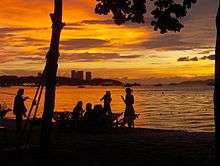
Pattaya produces on the order of 450 tonnes of solid waste per day. The city spends more than 300 million baht on waste removal and disposal annually. On average it pays 1,600 baht to process each tonne of garbage.[12] Significant volumes of rubbish are allegedly dumped into the sea by tour boats.[13]
In July 2017 Pattaya Beach was fouled for a week by raw sewage that poured out of a storm drain. City officials blamed the incident on broken pumps and Pattaya's poorly maintained sewage-treatment plant. The environmental ministry declared it would step up enforcement of pollution laws and push Pattaya for better wastewater-treatment efficiency. According to the ministry, Pattaya has 1,047 identified sources of sewage and garbage pollution, the number increasing as the city grows.[14] The sea water along central Pattaya beaches is of poor quality even in the absence of sewage spills and "could endanger human and marine life", the regional environmental office has said. They deemed sea water quality near central Pattaya beaches as "poor" and deteriorating. They judged water quality near Na Klua in North Pattaya, South Pattaya, Ko Lan, and Jomtien Beach as "fairly good". The city has considered expanding two water management plants to increase capacity for better treatment of wastewater prior to discharge into the ocean. The water treatment plant in Soi Wat Nongyai after expansion would be able to treat around 130,000 cubic metres of waste water a day, up from 80,000 cubic metres at present.[15] The expansion was never implemented.[16]
In November 2018, the Pattaya City Council approved 188 million baht for the repair of its six wastewater treatment plants. Installed in 2000, the plants can accommodate 65,000 m3 of wastewater per day. More than a third of plant equipment was found to be 40–50 percent worn out. The system treats waste from a 36 km2 portion of Pattaya, or 68 percent of its urban area. Earlier plans to increase treatment capacity to 135,000 m3 were never implemented and existing plants were allowed to fall into disrepair. Pattaya uses more than 200,000 m3 of water a day, but claims to only discharge about 70,000 m3 a day. The discrepancy is unexplained. Once treated, there are no tests to measure water quality before it is dumped back into the sea, which may account for foul water discharges.[16]
Economy
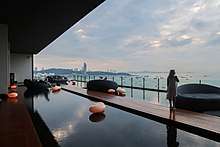
Pattaya is at the center of Thailand's Eastern Economic Corridor (EEC). Investments totaling more than 1.5 trillion baht (US$45 billion) are flowing into EEC infrastructure projects: airports, deep-sea ports, high-speed railways, autoroutes. The result will enhance Pattaya's accessibility. According to the Thai Chamber of Commerce (TCC) the EEC investments, the U-Tapao International Airport and the high-speed train that will link three major airports to Pattaya, will make Pattaya the heart of the eastern region. The TCC view is that, "Plenty of attractions...will lure lots more foreign and domestic tourists in the future." Better connectivity will reduce both the cost and time to travel to Pattaya, with the TCC estimating the number of tourists visiting the EEC region to rise to 46.7 million over the next few years, one and half times the current 29.8 million visitors. Pattaya projects include developing a tram in the city and building a bigger cruise terminal, as well as new tourist attractions: a water park, an ice dome, cultural markets, Thai boxing gyms, theaters, and conference halls. All are under development. "We aimed to get rid of the previous [seedy] image of Pattaya and try to promote a new image to show that Pattaya is a place for everyone with diversity of new tourist attractions," said an official of the Tourism Authority of Thailand (TAT). He said that the EEC would make Pattaya more competitive compared with other popular Thai beach destinations such as Phuket and Ko Samui, with cheaper transport costs.[17]
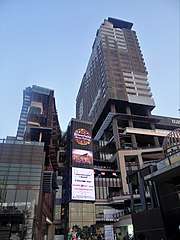
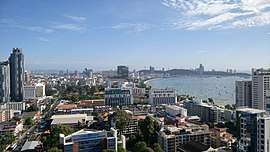
Fourteen million visitors in 2018 contributed 239 billion baht to the city's treasury. That represents more than 70% of Pattaya's total income for the year. The city's leadership plans to reduce Pattaya's reliance on tourism to 60% by 2025 by transforming itself into "Neo Pattaya", an international business center. Key to the plans are infrastructure improvements: 9.5 billion baht for flood management projects and upgrading sewage treatment plants to handle 130,000 m3 of waste per day, up from 67,000 m3 per day in 2019.[18]
Transportation
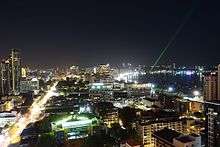
- Road
- Via the Bangkok-Chonburi-Pattaya Motorway (Hwy 7) The motorway is linked with Bangkok's Outer Ring Road., (Hwy 9) and there is also another entrance at Si Nakharin and Rama IX Junction.
- Via Bang Na-Trat Highway (Hwy 34) From Bang Na, Bang Phli, across the Bang Pakong River to Chonburi there is a Chonburi bypass that meets Sukhumvit Road, (Hwy 3, passing Bang Saen Beach, Bang Phra to Pattaya.
- Notable roads
- Pattaya 1 Road (Beach Road): runs along the beach.
- Pattaya 2 Road: (Second Road) runs approximately 400 metres inland, parallel to Pattaya 1 Road.
- Pattaya 3 Road: (Third Road) this is Pattaya's outer-ring road which connects north, south, and central Pattaya.
- Pattaya Tai: (South Pattaya Road) runs from Beach Road to Sukhumvit Highway.
- Pattaya Klang: (Central Pattaya Road) runs from Beach Road to Sukhumvit Highway.
- Pattaya Nuea: (North Pattaya Road) runs from Beach Road to Sukhumvit Highway.
- Tappraya Road: connects Pattaya 2 to Jomtien Beach Road.
- Thepprasit Road: connects Tappraya Road to Sukhumvit Highway.
- Soi Buakaow: connects Pattaya Tai and Pattaya Klang, between Pattaya 2 Road and Pattaya 3 Road.
- Rail
A daily service operates on the Eastern Line of the State Railway of Thailand between Pattaya and Hualumphong Station in Bangkok.[19]
- Bus
Pattaya is served by bus services from Bangkok's Northern Bus Terminal (Mo Chit) and the Eastern Bus Terminal (Ekamai), connecting to Pattaya's main bus terminal on Pattaya Nuea (North Pattaya Road) near Sukhumvit Road.
There are two airport bus services[20] The 389 Bus airportpattayabus service connects Pattaya with Suvarnabhumi Airport (BKK). It uses modern, air-conditioned buses, and takes around 1 1⁄2 hours to reach the airport. The trip from the airport (level 1 gate 8 at arrival hall) to the bus terminal in Pattaya, makes three stops at North, Central, and South Pattaya intersections before going to their last drop off point, the office on Thappraya road (near Jomtien). It can take longer if many hotel stops are negotiated along Sukhumvit Road in Pattaya.[21] The other bus service is the Bell Travel Service (Coach 36) which goes from the airport (Level 1 Between Gate 7 & 8) to the Pattaya Bell office at the North Pattaya Intersection, and then provides transfers to local hotels.[22]
Buses from a terminal on Sukhumvit Road near Pattaya Klang (near the Central Pattaya intersection) connect Pattaya with many destinations in the north-east (i.e., Isan).
City and suburban services are mainly provided by songthaew, popularly nicknamed "baht buses" or "blue taxis".
- Air
Pattaya is about 120 kilometres (75 mi) by road from Suvarnabhumi Airport (BKK), the country's largest international airport. By road, it is accessed from Sukhumvit Road and Motorway 7 from Bangkok. Pattaya is also served by scheduled flights via U-Tapao International Airport (UTP) which is 45-minute drive south of the city.
- Boat
A passenger-only ferry service from Pattaya to Hua Hin began operation on 12 January 2017 and is operated by Royal Passenger Liner.[23] By road, the journey takes five to six hours. The ferry shortens travel time to about two hours, subject to sea conditions. The ferry cruises at 27 knots on the 113 km journey across the Gulf of Thailand with a maximum passenger capacity of 150 persons. Larger ferries carrying up to 260 people may be added to the service later. Ferries capable of carrying vehicles are projected for 2020.[24] In November 2018, Hua Hin deputy chief Chareewat Phramanee confirmed the ferry service, suspended due to low tourist numbers during low season, would be up and running again for high season between Hua Hin and Pattaya, a 2.5-hour journey for 1,250 Thai Bhat on a catamaran with a maximum capacity of 340.[25]
Administration
| Subdistrict | Villages | People |
|---|---|---|
| Nong Prue | 7 | 67,846 |
| Na Klua | 7 | 49,129 |
| Nong Pla Lai | 3 | 2,403 |
| Huai Yai | 1 | 154 |
Pattaya city has been administered under a special autonomous system since 30 October 1978.[26] It has a status comparable to a municipality and is separately administered by the mayor of Pattaya city who is responsible for making policies, organising public services, and supervising the city's workforce for an area that covers 53.4 square kilometers and consists of four subdistricts, 18 villages (muban).[2]
Main sights
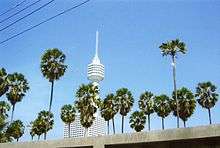
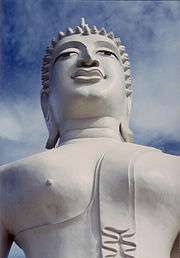
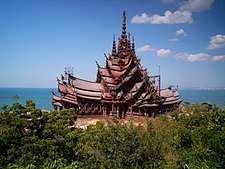
.jpg)
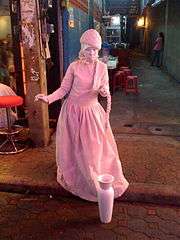
Once a fishing town, Pattaya first boomed as an R&R destination for US servicemen stationed at nearby former USAF base at U-Tapao, or other US bases in Thailand during the Vietnam War. It is striving to become a family-oriented seaside destination. In 2007, foreign tourists visiting Thailand totalled 14.5 million.[27]
Popular activities include golf (19 golf courses within 40 minutes of Pattaya[28]), go-kart racing, and visiting different theme parks and zoos such as the Elephant Village, where demonstrations of training methods and ancient ceremonial re-enactments are performed daily. The private Sri Racha Tiger Zoo features tigers, crocodiles, and other animals in daily shows. The Vimantaitalay tourist submarine offers 30-minute trips underwater to see corals and marine life just a few kilometres offshore. Nong Nooch Tropical Botanical Garden, about 15 kilometres south of Pattaya, is a 500-acre (2.0 km2) botanical garden and orchid nursery where cultural shows with trained chimpanzees and elephants are presented. The park also keeps several tigers and an assortment of birds.
Other attractions in Pattaya include the Million Years Stone Park, Pattaya Crocodile Farm, Pattaya Park Beach Resort Water Park, Funny Land Amusement Park, Siriporn Orchid Farm, Silverlake Winery, Underwater World Pattaya, the Thai Alangkarn Theater Pattaya (cultural show), Bottle Art Museum, Ripley's Believe It or Not Museum, and Underwater World, an aquarium with a collection of marine species from the Gulf of Thailand including sharks and stingrays. Khao Pratamnak or Khao Phra Bat is a small hill between south Pattaya and Jomtien Beach that provides a panoramic view of the city and its crescent bay. The hill is topped by Wat Khao Phra Bat, a temple, and the monument of Kromluang Chomphonkhetudomsak, who is regarded as the founding father of the modern Thai navy.
The Cartoon Network Amazone is a water park near the navy base golf course that was opened in late 2014. It has a Cartoon Network theme. The park includes different zones where different water slides can be seen. There is also a wave pool and surfing simulator that anyone can use, and the largest water playground in south-east Asia, which also includes two tipping buckets. A food court was opened later in 2014, and includes a large variety of cuisines, from traditional Thai food to Italian and Japanese food. Small huts are available for rent around the park. Yearly passes are available for those who wish to come there often and easily walk into the park. Several stores and gift shops are still under construction and are projected to be finished by late 2015.[29]
RamaYana, with a total size of more than 18 ha (45 acres / 102 Rai), is one of Asia’s biggest waterparks, was opened in May 2016. The park, which is designed as a modern waterpark built on an antique Asian city, offers 21 water slides, and some of them unique1, 2 dedicated children’s zones, a 600m long lazy river and a double wave pool with a 150m wide beach as well as relaxation and activity pools. The park, which is located 20 km south of Pattaya City, close to the big Buddha Mountain (Khao Chi Chan) and next to Silverlake vineyard, has natural lakes and islands in and around the park, and also includes attractions like a floating market, real elephants or a maze. A restaurant offers more than 100 dishes and food delivery to sun lounges, which are provided free of charge. The park also offers massage services and fish spa.
The Sanctuary of Truth is a large wooden temple by the sea at Laem Ratchawet that is being constructed since 1981 (there's already much to see).[30] It was conceived from the concept that human civilization owes its existence to religious and philosophical truth.
Thepprasit Market is the biggest and busiest market in Pattaya. It is open every Friday, Saturday, and Sunday evening on Thepprasit Road. It is known for selling pets, has many Thai food stalls including local specialities like fried insects and scorpions as well as branded clothing, shoes, and electronic goods.
Mini Siam is a miniature model village which celebrates the heritages of Thailand with replicas of the most famous monuments and historical sites including the Temple of the Emerald Buddha, Democracy Monument, the Bridge over the River Kwai, and Prasat Hin Phimai. Models of the Tower Bridge of London, Eiffel Tower, the Statue of Liberty, and Trevi Fountain are also displayed in the section called "mini-world".
Wat Yanasangwararam Woramahawihan is a temple constructed in 1976 for Somdet Phra Yanasangwon, the present supreme patriarch. Within the temple compound are a replica of the Buddha's footprint, and a large chedi containing Buddha relics.
Festivals and events
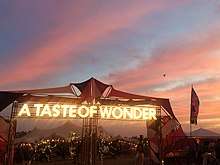
- Chinese New Year (varies from late January to early February) is celebrated by Pattaya's large Thai-Chinese community with dragon parades, lion dances, and fireworks.
- Burapa Pattaya Bike Week is Thailand's, and one of south-east Asia's, biggest motorcycle event held in Pattaya each February, drawing motorcycle enthusiasts from all over south-east Asia and abroad. The 2010 event was held over two days with local and international live music acts.[31]
- Pattaya International Music Festival is held annually in the month of March. It attracts huge crowds to the different stages along Beach Road and Bali Hai Pier, and presents several styles of music performed by Thai and international artists.
- The Pattaya Songkran festival, locally called Wan Lai, takes place each year in mid-April. It differs from most other Songkran festivals of Thailand in several aspects. It lasts several days longer and, besides water fights, the event includes beauty pageants, musical performances, cultural shows, fireworks, and water sports competitions.
- Top of the Gulf Regatta is a week-long sailing event held at the end of April, beginning of May.[32]
- The Miss Tiffany Universe beauty pageant is held mid-May each year. During the four-day pageant, Thailand's most beautiful transgender persons and transsexuals vie for first place with the final evening broadcast live on Thai TV for an audience of, on average, 15 million.[33][34][35][36]
- Pattaya Marathon, featuring several race categories, is held each year in July.[37]
- Pattaya Classical Guitar Festival, held annually on the last weekend of October, organized by the Thailand Guitar Society, Pattaya People Media Group, and Siam Bayshore Pattaya.
- Loi Krathong, a light festival held during the full moon of the twelfth month in the traditional Thai lunar calendar and which usually falls in November, is celebrated in Pattaya, as in the rest of the country, that evening with people floating krathongs (small, candle-lit floats made from elaborately folded banana leaves) on the waters, as well as releasing khom loi (candle-fired hot air balloons) into the night sky.
- Every November Pattaya hosts Miss International Queen, a yearly international pageant for transgender persons and transsexuals. In 2007 the event drew an estimated 25 million viewers on national TV.[38][39]
Nightlife
Pattaya has derived part of its reputation as a tourist destination due to the sex industry[40][41] and the resulting nightlife, and this notoriety has influenced the city's evolution in many ways.[42] Prostitution in Thailand is technically illegal but tolerated in most cities, including Pattaya.[43] The city's vast numbers of host bars, gogo bars, massage parlours, saunas, and hourly hotels, serve foreign tourists as well as locals. This is especially prominent on Walking Street as well as other areas around the city.[44] Efforts have been made to clean up the city's image.[45]
An article in the British tabloid the Daily Mirror[46] have described Pattaya as "the world's sex capital", a "modern-day Sodom and Gomorrah". This provoked anger from government officials as high up as Prime Minister Prayut Chan-o-cha. Pol Col Apichai Krobpetch, the Pattaya police superintendent, denied that Pattaya is a sex trade paradise. Upset about the British media's stories, he insisted they were fabricated. "There is no such thing as prostitution in Pattaya," said Col Apichai. "Where did they get the figure of 27,000 sex workers in Pattaya? Anyone can make up this information....Thai ladies having sex with foreigners is their personal issue. If they like each other, I don't see anything wrong with what they do behind closed doors."[47] In response, Pattaya social worker Surang Janyam, the director of Service Workers IN Group Foundation, said that estimated number of Pattaya prostitutes published in the Daily Mirror is inaccurate: "27,000 sex workers in Pattaya is way too low. We have a lot more sex workers than that."[47] In June 2019, over twenty high ranking Police, Army and Local government officers toured Pattaya and reported the central streets safe and free from illegal activities.[48]
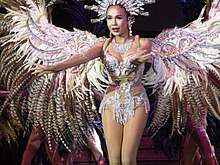
As evidence of the government's commitment to clean up Pattaya, on 26 February 2017 at 20:00, 60 police officers and soldiers raided Pattaya's notorious Soi 6 to check for violations of the law. When the checks were completed, police announced that all licenses were in order and there was no law breaking of any kind, including prostitution, taking place there.[49]
Pattaya also has Asia's largest gay scene[41] based around Boyztown, the Jomtien Complex, and Sunee Plaza. The city is also famous for its flamboyant kathoey cabaret shows where transsexual and transgender entertainers perform to packed houses.[50]
Crime
In recent years, Pattaya has served as a hideaway for foreigners with connections to organized crime in their home countries, and dozens have been murdered in gang-related disputes.[51][52]
People who visit the Pattaya area may encounter petty crime, usually limited to pickpocketing and confidence tricks, particularly in and around major tourist areas such as Jomtien and Pattaya Beaches and on the "baht buses". A special Tourist Police division has been established to aid tourists who are victims of crime. The 2009 British eight-episode TV documentary Big Trouble in Tourist Thailand described crimes involving tourists in Pattaya.[53]
On 11 April 2009, Thailand's Prime Minister Abhisit Vejjajiva declared a state of emergency in the areas of Pattaya and Chonburi, in response to Red Shirt anti-government protesters breaking into the conference center of the Royal Cliff Beach Resort hotel complex, the site of an ASEAN Summit. The meeting was immediately cancelled and Asian leaders were evacuated, some by helicopter.[54][55]
Law
In 2019 the International Thai Foundation ('ITF') established a Community Legal Centre in Soi Bua Kao, Pattaya. Its objectives are to promote education, protect human rights & relieve poverty for the people in Thailand. This is the third CLC in Thailand Pro Bono Community Hub in Chiang Mai
Media and communications
Several local foreign-language newspapers and magazines are published either weekly or monthly, especially in English, Russian and German. The English-language newspapers include the Pattaya Mail and Pattaya People. The Pattaya News is an online portal that writes the local news in 6 languages.
German-language dailies
- DER FARANG - German language, published every 14 days.
In Popular Media
The novel Platform by French author Michel Houellebecq prominently features the city of Pattaya as well as its nightlife.
Education
International schools in Pattaya:
- École francophone de Pattaya
- International School of Chonburi
- Tara Pattana International School
- Regents International School Pattaya
The Thai-Japanese Association School Sriracha, a Japanese international school, is in nearby Si Racha. It is an affiliate of the Thai-Japanese Association School in Bangkok.[56] Si Racha formerly housed the Sriracha-Pattaya Japanese Supplement School, a Japanese weekend school.[57]
Twin towns and sister cities
Pattaya has agreements with the following sister cities
|
|
|
See also
References
- "คำสั่งหัวหน้าคณะรักษาความสงบแห่งชาติ ที่ ๑๕/๒๕๖๑ เรื่อง การแก้ไขปัญหาการบริหารราชการเมืองพัทยา" (PDF).
- "รายงานสถิติจำนวนประชากรและบ้านประจำปี พ.ศ.2562" [Statistics, population and house statistics for the year 2019]. Registration Office Department of the Interior, Ministry of the Interior (in Thai). 31 December 2019. Retrieved 10 March 2020, archiving is not necessary because DOPA provides data from 1993 to future years.
- Schauseil, Jan. "Sattahip and the history of GIs coming to Pattaya". One Stop Pattaya. Archived from the original on 24 July 2015. Retrieved 12 April 2015.
- "Welcome to Pattaya". Sawadee.com. 2018. Retrieved 25 February 2020.
- "Climatological Data for the Period 1981–2010". Thai Meteorological Department. pp. 19–20. Retrieved 4 August 2016.
- "ปริมาณการใช้น้ำของพืชอ้างอิงโดยวิธีของ Penman Monteith (Reference Crop Evapotranspiration by Penman Monteith)" (PDF) (in Thai). Office of Water Management and Hydrology, Royal Irrigation Department. p. 95. Retrieved 4 August 2016.
- "Thailand: Urban Areas - Population Statistics, Maps, Charts, Weather and Web Information". www.citypopulation.de.
- "Chinese put squeeze on Pattaya's hotels". Bangkok Post. 15 July 2015. Retrieved 12 March 2018.
- Pupattanapong, Chaiyot (5 August 2018). "Restored Pattaya beach lures tourists". Bangkok Post. Retrieved 5 August 2018.
- Pupattanapong, Chaiyot (7 August 2018). "Pattaya City beach sand-fill project hit hard by flooding". Bangkok Post. Retrieved 7 August 2018.
- Pupattanapong, Chaiyot (21 June 2016). "Pattaya sea water quality gets 'poor' grade". Bangkok Post. Retrieved 21 June 2016.
- Pupattanapong, Chaiyot (26 April 2018). "Pattaya official thinks garbage figures are rubbish". Bangkok Post. Retrieved 26 April 2018.
- "Pattaya beach businesses blame tourist boat operators for rising level of garbage being washed ashore". The Nation. 3 January 2018. Retrieved 26 April 2018.
- Homklin, Jetsada (16 September 2017). "Pattaya sewage problem in government crosshairs". Pattaya Mail. Retrieved 26 April 2018.
- Pupattanapong, Chaiyot (21 June 2016). "Pattaya sea water quality gets 'poor' grade". Bangkok Post. Retrieved 26 April 2018.
- Pupattanapong, Chaiyot (23 November 2018). "Wastewater stations to get B188m". Bangkok Post. Retrieved 26 November 2018.
- Phoonphongphiphat, Apornrath (6 August 2018). "Thai businesses to revitalize Pattaya tourism via economic zone". Nikkei Asian Review. Retrieved 7 August 2018.
- Worrachaddjechai, Dusida (10 October 2019). "Beach resort banking on Neo Pattaya". Bangkok Post. Retrieved 11 October 2019.
- "Pattaya Railway Station". Bangkok Post. Retrieved 20 October 2012.
- "Bangkok Airport Bus to Pattaya | BKK Airport to Pattaya Timetable". Bangkok Travel Ideas.
- "airportpattayabus 389 Bus". Archived from the original on 7 November 2016. Retrieved 7 November 2016.
- "Bell Travel Service – Convenient shuttle coach service between Bangkok and Pattaya".
- "Royal Passenger Liner Co.,Ltd". royalferrygroup.com.
- "Pattaya-Hua Hin ferry to begin on New Year's Day". Bangkok Post. 13 November 2016. Retrieved 13 November 2016.
- "Hua Hin ferry service back again for high season". Phuket: The Thaiger. 4 November 2018. Retrieved 4 November 2018.
- "พระราชบัญญัตี ระเบียบบริหารราชการเมืองพัทยา พ.ศ. ๒๕๒๑" [Regulations of the Pattaya City Administration B.E. 2521 (1978)] (PDF). Royal Thai Government Gazette. 95 (special 120 Kor): 1–44. 30 October 1978. Retrieved 5 April 2020.
- Tourism Authority of Thailand Archived 4 October 2011 at the Wayback Machine. tat.or.th. Retrieved on 14 December 2011.
- "Golf Courses in Chonburi". birdie.in.th. Retrieved 15 June 2016.
- "Cartoon Network Amazone". cartoonnetworkamazone.com. Cartoon Network Amazone. 2015. Retrieved 11 January 2014.
- "Sanctuary of Truth, Pattaya | Travel guide". Thailand.FalkTime. 21 May 2019. Retrieved 30 May 2019.
- ''Pattaya Bike Week, 2010– Driving for Peace'' Archived 17 November 2010 at the Wayback Machine. Pattaya Daily News. Retrieved on 14 December 2011.
- Top of the Gulf Regatta (official website)
- Miss Tiffany's Universe ''(official website)''. Misstiffanyuniverse.com. Retrieved on 14 December 2011.
- Miss Tiffany's Universe 2009 Archived 23 October 2010 at the Wayback Machine. Misstiffanyuniverse.com. Retrieved on 14 December 2011.
- "Asia News, 21 May–3 Jun 2010: Mistaken Identity (p. 34-35)" (PDF). Archived from the original on 24 May 2010.CS1 maint: unfit url (link) (PDF) . Retrieved on 14 December 2011.
- Miss Tiffany Universe Pageant Archived 13 January 2011 at the Wayback Machine. Theasiatrust.org. Retrieved on 14 December 2011.
- Pattaya Marathon 2011 Archived 18 January 2012 at the Wayback Machine. 17 July 2011
- ''Thailand: Situation and treatment of homosexuals, transsexuals and transgender persons; whether the government updated the constitution to provide rights to homosexuals, transsexuals and transgender persons (2005–2007)''. UNHCR. Retrieved on 14 December 2011.
- Miss International Queen ''(official website)''. Missinternationalqueen.com. Retrieved on 14 December 2011.
- Nopporn Wong-Anan Children lured into Thai sex industry in Pattaya. Reuters. 15 December 2006
- Marshall, Andrew (15 August 2005). "The People's Paradise". TIMEasia. Retrieved 26 February 2017.
- Encyclopedia of Prostitution and Sex Work, volume 2, 2006, p. 454, Greenwood Press, ISBN 0-313-32968-0
- Yodmanee Tepanon (2006) Exploring the Minds of Sex Tourists: The Psychological Motivation of Liminal People Archived 24 January 2011 at the Wayback Machine. (PDF). PhD Thesis, Virginia Polytechnic Institute. Retrieved on 14 December 2011.
- Frommer's Thailand, 7th ed, 2006, p. 170, Wiley Publishing, Inc.
- Fuller, Thomas (15 September 2010). "A Thai City of Sleaze Tries to Clean Up". The New York Times. Retrieved 13 October 2010.
- Baynes, Chris (17 February 2017). "Inside the world's sex capital: City dubbed 'modern day Sodom and Gomorrah' with highest number of prostitutes anywhere". Daily Mirror. Retrieved 26 February 2017.
- Yongcharoenchai, Chaiyot (26 February 2017). "No sex please, we're Thai". Bangkok Post. Retrieved 26 February 2017.
- "Phew! No Prostitutes in Pattaya's Walking Street – Police". 7 June 2019. Retrieved 8 June 2019.
- "Intense police examination to prevent prostitution". SiamChon News (in Thai). 27 February 2017. Archived from the original on 1 March 2017. Retrieved 28 February 2017.
- "Nightlife in Pattaya". Frommer's. 2010. Retrieved 3 October 2010.
- "Thailand's Costa del Crime". The Nation. 7 November 2005. Archived from the original (Editorial) on 24 July 2013. Retrieved 16 June 2012.
- Campbell, Duncan (11 April 2005). "Great Escape". The Guardian. London.
- Karla Cripps (11 September 2009). "Drugs, scams and beat downs. Just another night of 'Big Trouble in Tourist Thailand'". CNN.
- "Thai protests force Asia summit cancellation". Reuters. 11 April 2009.
- Fuller, Thomas (11 April 2009). "Thailand Cancels Summit After Protests". The New York Times. Retrieved 26 April 2018.
- "学校案内 シラチャ校アクセス ." Thai Japanese Association School. Retrieved on 9 January 2018. Archived 9 January 2018 at the Wayback Machine
- "アジアの補習授業校一覧" (). MEXT. 2 January 2003. Retrieved on 12 January 2018. "シラチヤ・パタヤ SRIRAOHA [sic]・PATTAYA JAPANESE SUPPLEMENT SCHOOL
- "Pattaya, Qingdao ink sister-city agreement". pattayamail.com. 31 January 2013. Retrieved 29 March 2017.
- "Pattaya, Hubei sign sister-city agreement". pattayamail.com. 5 November 2014. Retrieved 29 March 2017.
- "Zhangjiajie City and Thailand Chonburi City Pattaya City became sister cities". 10 December 2016. Retrieved 16 June 2017.
External links
| Wikimedia Commons has media related to: |

- Thailand's Sin City Reaches for Respectability – slideshow by The New York Times



